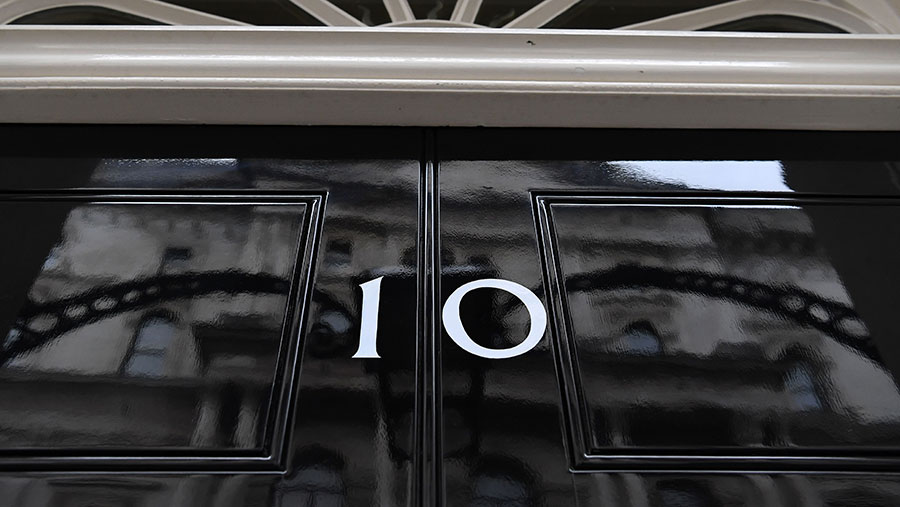Election 2019: What the main political parties plan for farming
 © Andy Rain/EPA-EFE/Shutterstock
© Andy Rain/EPA-EFE/Shutterstock With election day fast approaching, what each party has to offer is becoming a little clearer. Philip Clarke picks out the highlights
One by one the main political parties have issued their manifestos, setting out their policies and ambitions – for the economy as a whole and for agriculture.
Farmers Weekly would never presume to tell readers how to vote, but we can set out what is on offer. What is actually delivered by the next government is, of course, open to speculation.
See also: FW Opinion – Farmers need to get engaged in election
 Conservatives “Get Brexit Done – Unleashing Britain’s Potential”
Conservatives “Get Brexit Done – Unleashing Britain’s Potential”
“Get Brexit done” is the mantra of the Conservative Party, as it aims to push on with life outside the European Union.
It sets out a five-point post-Brexit deal for farming, namely:
- A shift from the “bureaucratic” CAP to a new system based on “public money for public goods” with a seven-year transition
- A promise to maintain current EU spending on UK agriculture (about £3.2bn/year) for the next five years
- A requirement for farmers to protect the environment and safeguard animal welfare through an environmental land management system
- Encouragement for the public sector to “buy British”
- An increase in the annual quota under the Seasonal Agricultural Workers Scheme from 2,500 to 10,000, and a points-based system for skilled migrant workers.
Other commitments include a promise to roll out gigabit broadband to every home and business in the country by 2025, with £5bn already earmarked for this purpose.
And, with the Tories promising to put an extra 20,000 more police officers on the streets, some of them should be available to tackle rural crime.
Trade and animals
The manifesto also stresses the importance of free trade as the best way to “increase exports, cut prices for consumers, increase investment and create jobs”.
The Conservatives aim to have 80% of UK trade covered by free trade agreements in the next three years, “starting with the US, Australia, New Zealand and Japan”.
“In all our trade negotiations, we will not compromise on our high environmental protection, animal welfare and food standards,” it says.
On animal welfare, the Conservatives are promising “an end to excessively long journeys for slaughter and fattening” and the abolition of the “cruel live shipment of animals”.
Farmers weekly says
Given that the Conservatives have been in power for almost a decade, the policies outlined in the manifesto contain few surprises.
The most eye-catching is the promise to maintain current funding levels until 2025 – though the phasing out of direct payments to be replaced with an environmental land management system will get under way relatively quickly.
Plans to have legally binding targets for environmental delivery and the banning of live exports are concerning.
 Labour “It’s time for real change”
Labour “It’s time for real change”
Labour has described its election manifesto as “the most radical and ambitious plan to transform our country in decades”.
Here are 15 significant pledges that would affect food and farming:
- Land Invest in more county council farms and increase access for new entrants
- Wages Re-establish an Agricultural Wages Board in England
- Bovine TB End the “ineffective” badger cull
- Rural crime Boost police resources to tackle rural and wildlife crime
- Brexit Secure a new deal with the EU and put it to a legally binding referendum
- Trade Reject any trade agreements that undermine UK standards
- Flooding Provide an extra £5.6bn in funding to improve flood control
- Climate/environment Set binding new standards for decarbonisation, nature recovery, environmental quality and habitat/species protection
- Agencies Increase funding for Defra executive agencies, including £50m for Natural England
- Local food Establish local food networks
- Food security Establish a national food commission and make food security a reason to intervene in the economy
- Tree-planting Embark on an ambitious programme of tree planting
- Connectivity Provide free broadband for all, delivered by part-nationalising BT
- National Parks Create new National Parks
- Migrant workers Establish a humane immigration system, aimed at meeting the skills and labour shortages that exist in the economy.
Farmers weekly says
It is often said that farmers do better under a Labour government.
Historically, this may have been due to their more interventionist polices – it was a Labour government that introduced the 1947 Agriculture Act, signalling a “golden age” for British farming.
Many of the ideas in the Labour manifesto smack of continued intervention.
Should the overall economy suffer as a result, that may still be good for agriculture, especially if it triggers a further weakening of sterling, which can boost farm incomes.
 Liberal Democrats “Stop Brexit. Build a Brighter Future”
Liberal Democrats “Stop Brexit. Build a Brighter Future”
A Lib Dem government would mean a shift towards a greener agriculture, but with more money in the pot.
The manifesto promises at least £18bn over five years, equivalent to £3.6bn each year, or about £400m more to UK agriculture than it currently receives under the CAP.
In addition, the Lib Dems would reduce support payments for larger farmers and redistribute the savings to public goods projects, with legally-binding targets for improving water, air, soil and biodiversity .
Suggested measures include:
- A £5bn fund for flood prevention
- The planting of 60 million trees a year by 2025
- Investment in workable vaccines to control bovine TB
- Higher animal welfare standards
- A budget increase for Defra and its agencies.
Farmers weekly says
The Lib Dems are determined to remain in the EU, believing this will create a ‘remain bonus’ of £50bn, with the extra money used to invest in a range of sectors. It is the only party to seek a substantial increase in funding for agriculture.
But it also favours taking more support from larger farmers to fund agri-environment projects.
Farmers Weekly has always opposed this, given that bigger farms support more people and often lead the way in environmental protection.
 Green Party “If not now, when?”
Green Party “If not now, when?”
According to the Green Party manifesto, it wants to “transform our relationship with the land”.
“We want to increase the opportunities for food growing, for greening our landscape and improving our health… through reforestation, rewilding and regenerative farming.”
Specific measures include:
- Phase in a tax on meat and dairy products to support a transition to plant-based diets
- Introduce a new land value tax
- Reduce pesticide use by at least 50% by overall weight by 2022
- Plant 700 million new trees, with 50% of all farms engaged in agro-forestry by 2030
- End the badger cull
- Encourage rewilding
- Ban the import and production of all GM food, including from animals fed on GMs
- Allow food waste to be fed to chickens and pigs.
Farmers weekly says
Encouraging more tree planting, including in the uplands, makes sense, so long as farmers are properly rewarded for it, while recycling food waste is also commendable, subject to rigorous disease risk controls.
But most of the other policies would undermine the viability of British farming and simply export the environmental problems to other parts of the world.
 Plaid Cymru “Wales, it’s us”
Plaid Cymru “Wales, it’s us”
Even though Wales overall voted to leave the EU, Plaid Cymru says it wants a second referendum and would like to remain in the European Union.
For agriculture it suggests:
- Retain direct payments to farmers, upon which they depend for more than half their income
- Ensure future trade deals strengthen rather than weaken animal welfare legislation, with imports meeting Welsh standards
- Control badger numbers as part of the solution to eradicating bovine TB
- Give police forces more powers to trace and deal with dogs that attack sheep
- Maintain geographical Indications for meat and produce such as Welsh lamb, Welsh beef and Pembrokeshire new potatoes in future trade deals
- Encourage organic farming to bolster biodiversity
- Ensure Wales remains GM-free
- Support public procurement bodies to “buy Welsh”.
Farmers weekly says
Wary of the fact farmers in Scotland, Northern Ireland and the rest of the EU are likely to retain some direct payments, Plaid is the only party seeking the same treatment for its farmers, rather than moving to a system of environmental payments.
 The Brexit Party “Contract with the people”
The Brexit Party “Contract with the people”
The Brexit Party has not issued an official manifesto, dismissing such documents as “a set of vague promises that its authors have no intention of keeping”.
Instead it has issued a “contract with the people”.
There is little mention of agriculture, except to say the party will “maintain subsidies paid by the EU to UK business such as farmers”, but it will eliminate import tariffs on certain foods.
It will also provide free base-level broadband, plant more trees and target “county lines” drug dealers.
Farmers weekly says
The Brexit Party is putting candidates forward in fewer than half of all constituencies, but its lack of policies relating to agriculture and its desire to set import tariffs at zero show a degree of complacency towards rural areas from which much of its support has come.
Scottish National Party (SNP) “Stronger for Scotland”
The SNP says it will continue fighting to remain in the European Union and to achieve independence for Scotland, which it believes will benefit farmers.
If Brexit does still go ahead, then its priority is to prevent “no deal”, resist any attempts by Westminster to reclaim any devolved powers, and to “make the UK government pay all the costs to Scotland’s rural economy resulting from Brexit”.
In relation to agriculture, the SNP promises to:
- Fight for the repatriation of the “red meat levy”, worth £2m, that goes to the AHDB, as Scottish-reared cattle are slaughtered in England
- Strengthen the Groceries Code Adjudicator to root out unfair treatment of farmers
- Ensure funding for agriculture is repatriated to Scotland post-Brexit
- Push for more government bodies to buy Scottish food
- Maintain GM-free status
- Promote the use of Protected Geographical Indicators for items such as Scotch lamb and Arbroath smokies
- Press for a seasonal workers scheme to meet the needs of Scotland
- Roll out superfast broadband to all Scottish homes and businesses
- Plant 30 million trees in Scotland by 2025.
It will also fight to prevent the imposition of tariffs on exports of red meat, but if this still happens, it will demand full compensation.
Farmers Weekly says
Even though the polls are predicting a Conservative majority in Westminster, should there be a hung parliament, the SNP may hold the balance of power in a future coalition.
But even without this, it is likely that the Holyrood government will still have a great deal of discretion over how it runs its agriculture, as this is highly likely to remain devolved, though as yet there is no clarity as to how much money it will have at its disposal if Brexit goes ahead.
